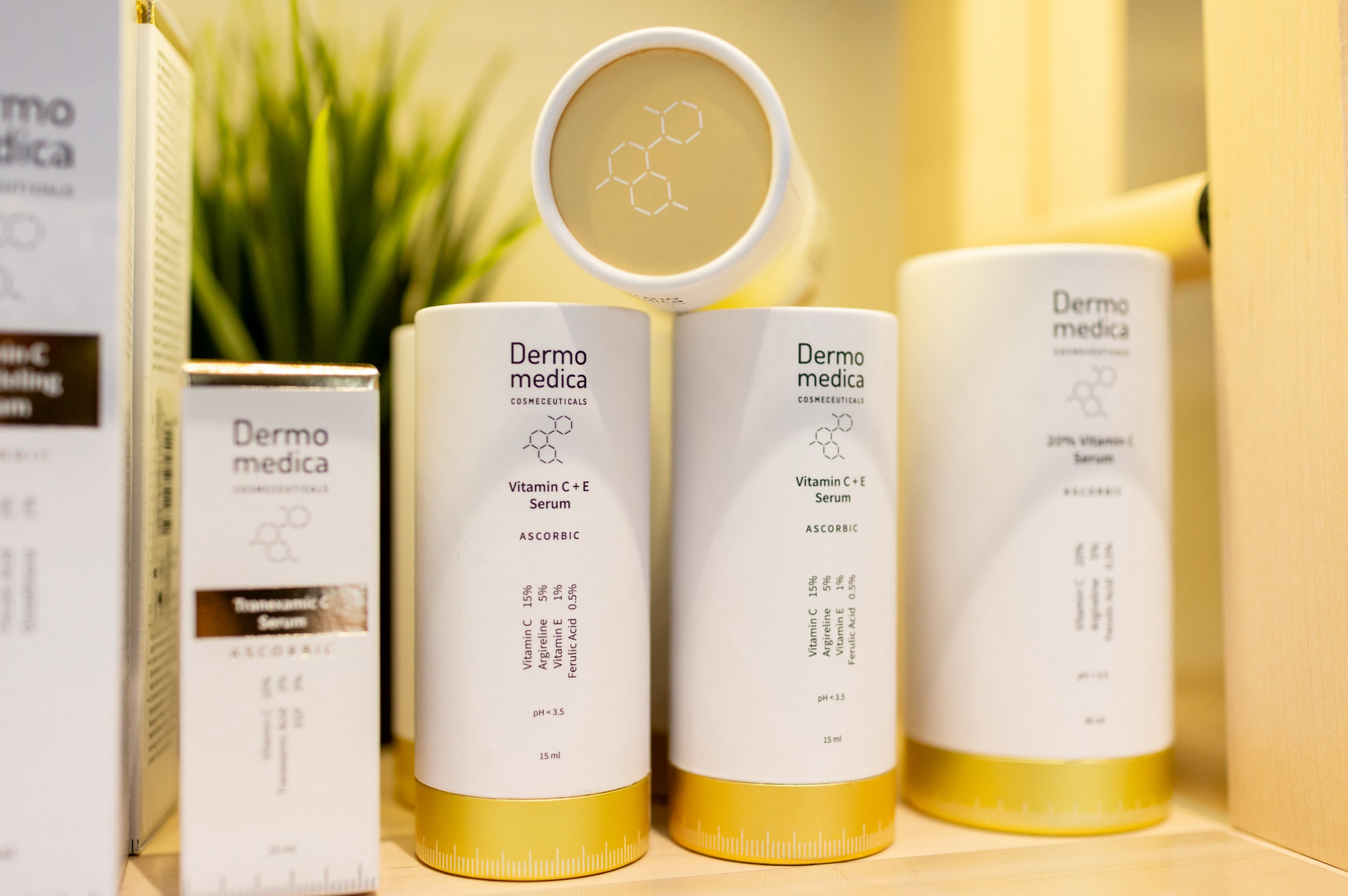
Each type of skin has its own characteristics and requires different care. Based on these characteristics, there are five types of skin: normal, dry, oily, combination, and sensitive
Normal Skin
Normal Skin is used to describe well-balanced skin. This type of skin is neither too oily nor too dry, which means it has a healthy balance of both water and oil. It has small pores, a smooth texture, and a healthy complexion with no acne blemishes & sensitivity.
If this doesn’t sound like your skin, you might want to stay away from “normal skin” products because they could be aggregating your skin even more.
So, to maintain your normal skin use gentle, pH-balanced cleanser twice daily. Moisturize regularly to keep the skin hydrated and protect it from external aggressors (sun, pollution, temperature changes, aggressive products, stress, smoking, blue light emitted by screens).
Use a broad-spectrum sunscreen SPF EVRYDAY! to prevent premature aging and sun damage.
While normal skin is generally resilient, it can still experience occasional breakouts, dryness, or sensitivity due to environmental factors or hormonal changes.
Dry Skin
Dry Skin is used to describe a skin type that is dull and can be rough and flakey. This Type of skin often feels tight and is prone to showing fine lines. The skin feels dry because it produces less sebum than normal skin. With less sebum, the dry skin lacks the lipids that it needs to lock in moisture and to build a strong outer layer of skin. The skin primarily loses moisture in two ways — perspiration and trans-epidermal water loss.
Dry skin is susceptible to irritation, redness, and itching. Without proper care, it can lead to more severe conditions like eczema or dermatitis.
To help dry skin hydrate dry skin with rich, emollient moisturizers containing ingredients like hyaluronic acid, glycerine, or shea butter. Avoid hot showers and harsh soaps, which can strip the skin of its natural oils. Incorporate a nourishing night cream to replenish moisture while you sleep.
DRINK 1,5-2L a WATER EVRYDAY!
Oily Skin
Oil skin is used to describe a skin type with lots of sebum production, which makes the skin look and feel shiny and greasy. Oily skin tends to show more in the T-zone near the forehead, nose, and chin. Those with oily skin are more likely to have bigger pores and have more tendency for acne breakouts & blemishes.
Oily skin is prone to blackheads, whiteheads, and acne due to the accumulation of oil and dead skin cells in the pores. It can also be sensitive and easily irritated, so its very important to treat that type of skin with right product to bring the balance and healthy complexion to the skin.
To achieve that use a double cleansing routine every evening with oil & foaming cleanser to remove excess oil and impurities.
Use oil-free, non-comedogenic moisturizers and sunscreen to hydrate and protect without clogging pores. Incorporate products containing salicylic acid, azelaic acid, zinc, vit B3 - niacinamide to control acne and reduce inflammation.
Combination Skin
Combination skin is characterised by a mix of oily and dry areas, typically with an oily T-zone (forehead, nose, and chin) and drier cheeks. It requires a balanced skincare approach to address different concerns simultaneously.
Combination skin can experience fluctuations in oil production, leading to both dryness and shine throughout the day. Finding the right products that balance oiliness without over-drying can be challenging.
To control that type of skin use a gentle cleanser to remove impurities without stripping the skin's natural oils. Apply lightweight, oil-free moisturizers to hydrate dry areas without exacerbating oiliness. Use targeted treatments, such as mattifying primers or blotting papers, to manage shine in the T-zone. Good practice it is using a two different types of face mask to target her needs.
Sensitive Skin
Sensitive skin is one of the hardest to treat us is prone to irritation, burning, redness, and inflammation in response to various triggers such as skincare products, weather changes, or environmental factors like sun exposure, wind, or extreme temperatures.
Individuals with sensitive skin may experience discomfort or allergic reactions when exposed to certain ingredients so it requires gentle care us skin may react adversely to skincare containing fragrances, alcohol, harsh chemicals, or allergens.
Choose fragrance-free, hypoallergenic skincare products specifically formulated for sensitive skin. Look for gentle cleansers, moisturizers, and sunscreen containing soothing ingredients like vitamin B3 -niacinamide, aloe vera, chamomile, or oat extract.
Perform patch tests before applying new products or ask for the samples to ensure compatibility and minimize the risk of reactions. Avoid harsh exfoliants and aggressive treatments that can further irritate sensitive skin.
Aging skin
As we age, the skin undergoes natural changes such as decreased collagen and elastin production, leading to wrinkles, fine lines, and sagging. Aging skin also becomes thinner and drier, making it more susceptible to damage from environmental stressors and slower wound healing. Treating Aging skin it’s not only minimise the fine line & wrinkles its also preventing for example applying SPF everyday !!!! to protect the DNA of your cells.
We will cover this topic in the next BLOG article because is deserved to be discussed in details.
How to Identify Your Skin Type?
If you’re not sure what your skin type is, you don’t need to take a fancy skin type quiz. You can easily test your skin type at home by observing your skin.
Follow these simple steps to identify your skin type:
- Wash your face with a gentle cleanser and gently pat dry.
- Go about your day for about an hour, resisting the urge to touch your face.
- After an hour, dab your T-zone with a blotting sheet or a tissue.
- Now check the tissue and examine your face for the following signs:1
- Normal skin: No flakes or grease on the sheet, and no face redness or irritation
- Dry skin: No grease on tissue, but skin is flakey, tight, or rough.
- Oily skin: Tissue is greasy, and the face looks shiny. Pores may also appear enlarged or inflamed.
- Combination skin: Tissue is greasy, and T-zone looks shiny. Other areas of the face are flaky and dry.
- Sensitive skin: Tissue may or may not be greasy, and skin looks irritated and red
- Aging Skin: Visual file lines& wrinkles , loose elasticity, some sun damage and pigmentation
Does Skin Type Change?
Over time, skin typically becomes more dry, but your skin type can change for various reasons. Here’s how you can start to develop a different skin type:
- Aging: Getting older causes the skin to lose collagen a protein that helps keep the skin plump and elastic. As a result, more mature skin appears thinner and less elastic—often causing fine lines and wrinkles. Thinner skin can be more delicate, sensitive, and prone to dryness.
- Hormonal changes: Teenagers going through puberty typically produce more sebum, causing oily, acne-prone skin. As people age, they produce less sebum, which causes dryer skin. Hormonal changes during menopause also dry out the skin as the skin struggles to retain water.
- Climate and environment: Cold winter weather and low-humidity climates lack moisture in the air, leading to dry skin. Turning on the heat in cold weather also reduces humidity, drying out skin. Humid climates and hot summer weather can also make the skin produce more oils, resulting in oilier skin.
- Sun damage: Unprotected sun exposure can damage skin, making it sensitive, dry, and thin. It can also cause dark spots (hyperpigmentation) and premature fine lines.
- Smoking: Smoking can also visibly age skin, causing dry, thin skin. Smoking can also delay skin wound healing and increase the risk of psoriasis.
- Underlying conditions and nutrient deficiencies: diabetes, kidney disease, and thyroid disease can lead to excessively dry skin. Vitamin A, zinc, niacin, or iro deficiency can also cause dry skin.
Let me tell You about main Skin Problems
- Acne is a common skin condition characterized by the formation of pimples, blackheads, whiteheads, and cysts due to clogged pores, excess oil production, and inflammation. Acne can occur at any age but is most prevalent during adolescence and may persist into adulthood.
- Hyperpigmentation: refers to darkening of the skin caused by an overproduction of melanin, the pigment responsible for skin colour. Common types of hyperpigmentation include sunspots, melasma, and post-inflammatory hyperpigmentation (PIH) resulting from acne or other skin injuries.
- Eczema, also known as atopic dermatitis, is a chronic inflammatory skin condition characterized by red, itchy, and inflamed patches of skin. Eczema can flare up in response to triggers such as allergens, stress, dry air, or irritants in skincare products.
- Rosacea: Rosacea is a chronic skin condition that causes redness, flushing, visible blood vessels, and sometimes acne-like bumps on the face. It often affects the cheeks, nose, chin, and forehead and may worsen with triggers such as sunlight, spicy foods, alcohol, or stress.
- Psoriasis is a chronic autoimmune condition characterized by the rapid proliferation of skin cells, leading to thick, scaly patches on the skin's surface. These patches, known as plaques, can be itchy, painful, and may crack or bleed. Psoriasis can occur anywhere on the body and may also affect the nails and joints.
- Dryness and Dehydration: Dry skin lacks moisture and may feel tight, rough, or flakey. Dehydrated skin, on the other hand, lacks water and may appear dull, tired, and prone to fine lines and wrinkles. Both conditions can be exacerbated by factors such as harsh weather, hot showers, and insufficient hydration.

Understanding the different types of skin and common skin problems is essential for developing an effective skin care routine and seeking appropriate treatment when needed consulting with the cosmetologist can help identify your skin time address any concerns and tailor a skin care regime to achieve healthy radiant skin.


